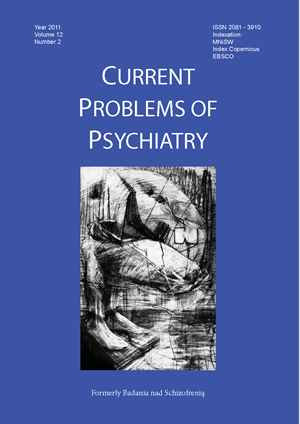Evaluation of mitochondrial pathway in L-arginine induced apoptosis of rat’s hepatocytes
Keywords:
nitric oxide, apoptosis, kaspase 9, Bcl-2 proteins, liverAbstract
The intrinsic pathway of apoptosis is activated by cellular stress. This pathway initiates apoptosis via involvement of mitochon-dria: indirect and direct. The aim of present study was immunhistochemical evaluation of expression of proteins: caspase 9 bax and bcl-2 involved in mitochondrial pathway of cell death in L-arginine induced apoptosis of rats’ hepatocytes.
The rats used in this experiment were divided into 2 equal groups. Experimental: rats received per os L-arginine 40mg/kg body weight, every other day for 2 weeks and were decapitated after 3 weeks of the experiment. Control rats received per os 2ml of distilled water every other day for 2 weeks and were decapitated after 3 weeks of the experiment.
Specimens taken after decapitation were examined in immunohistochemical way using standard three step method to detect im-munolocalization of caspase 9,bax and bcl-2. The results of immunohistochemical examinations were subjected to qualitative evaluation taking into account the intensity of colour reaction at the antigen-antibody site in rat liver examined in individual groups. The quantita-tive evaluation was using the Analysis-pro software. The surface area of cells with positive reaction (+) was calculated.
The study shows, that L-arginine as a donor of exogenous nitric oxide did not induced mitochondrial way of apoptosis by direct and indirect damage of hepatocytes’ mitochondria and activation of bax and caspase 9.
References
1. Maleck W.H., Piper S.N., Koetter K. Joseph Priestley, nitrous oxide and oxygen. Anaesthesist, 2005; 54: 395-396.
2. Hibbs J.B. Jr, Taintor R.R., Vavrin Z., Rachlin E.M. Nitric oxide: a cytotoxic activated macrophage effector molecule. Biochem. Biophys. Res. Commun., 1988; 157: 87-94.
3. Ignarro L.J. Endothelium derived nitric oxide: actions and properties. FASEB J., 1989; 3: 31-36.
4. Laskowska E. Małe białka szoku termicznego – rola w apoptozie, karcynognezie i chorobach związanych z agregacją białek. Postępy Bioch., 2007; 53: 19-26.
5. Kaźmierczuk A. HSP 27 antyoksydacyjne właściwości, które chronią komórki nerwowe przed uszkodzeniem i zapobiegają wielu chorobom neurodegeneracyjnym. Postęp. Hig. Med. Dośw., 2010; 64: 273-283.
6. Bielak-Żmijewska A. Mechanizmy oporności komórek no– wotworowych na apoptozę. Kosmos. Problemy Nauk Biologicznych, 2003; 52: 157-171.
7. Igney F.H., Krammer P.H. Death and anti-death: tumor resistance to apoptosis. Nat. Rev. Cancer, 2002; 2: 277-288.
8. Eu J.P., Liu L., Zeng M., Stamler J.S. An apoptotic model for nitrosative stress. Biochemistry, 2000; 39: 1040-1047.
9. Wolter K.G., Hsu Y.T., Smith C.L., Nechushtan A., Xi X.G., Youle R.J. Movement of BAX from the cytosol to mitochondria during apoptosis. J. Cell. Biol., 1997; 139: 1281-1292.
10. Castedo M., Hirsch T., Susin S.A., Zamzami N., Marchetti P., Macho A., Kroemer G. Sequential acquisition of mitochondrial and plasma membrane alterations during early lymphocyte apoptosis. J. Immunol., 1996; 157: 512-521.
11. Domiński Z. Apoptoza: śmierć komórek w życiu organizmów zwierzęcych. Kosmos, 1999; 48: 385-396.
12. Hockenberry M. Bcl-2 is an inner mitochondrial membrane protein that blocks programmed cell death. Nature, 1990; 348: 334-338.
13. Pryjma J. Monocyty krwi obwodowej – apoptoza po fagocytozie bakterii oraz zmiany funkcjonalne w następstwie kontaktu z komorkami apoptotycznymi www. fnp.org.pl/programy aktualne/jachranka/profPryjma.pdf. 2004, 1-19.
14. Cherla G., Jaimes E.A. Role of L-arginine in the pathogenesis and treatment of renal disease. J. Nutr. 2004; 134: 2801S-2806S.
15. Rytlewski K., Olszanecki R., Korbut R., Zdebski Z. Effects of prolonged oral supplementation with l-arginine on blood pressure and nitric oxide synthesis in preeclampsia: Eur. J. Clin. Invest., 2005; 35: 32-7.
Downloads
Published
Issue
Section
License
Copyright (c) 2011 Authors

This work is licensed under a Creative Commons Attribution-NonCommercial-NoDerivatives 3.0 Unported License.


